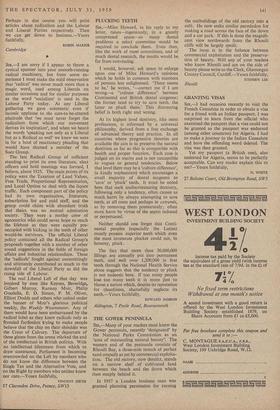SIR,—I am sorry if I appear to throw a cynical
spanner into your smooth-running radical machinery, but from some ex- perience I must make the mild observation that `radical' was never much more than a magic word, used among Liberals on similar occasions and for similar purposes as the word `socialism' is used in the Labour Party today. At any Liberal gathering we gave automatic even if laconic applause to the sure-to-be-uttered platitude that 'we must never forget the radicalism from which our movement derives its inspiration', and when we heard the words `speaking not only as a Liberal but as a Radical as well' we knew we were in for a bout of reactionary pleading that would have shamed a member of the Suez Group.
The last Radical Group of sufficient standing to print its own literature, elect officers and hold meetings was formed, I believe, about 1925. The main points of its policy were the Taxation of Land Values, Free Trade, Proportional Representation, and Local Option to deal with the liquor traffic. Each component part of the policy had its own organisation, literature, subscription list and paid staff, and the group could claim with abundant truth that theirs was no mutual admiration society. They were a motley crew of egocentrics who could never hope to reach the lifeboat as they were equally pre- occupied with kicking in the teeth of other would-be survivors. The official Liberal policy contained all the Radical Group's proposals together with a number of other sound suggestions in the fields of foreign affairs and industrial relationships. These the `radicals' fought against unremittingly and ultimately contributed as much to the downfall of the Liberal Party as did the rising tide df Labour.
The real Liberal Left of that day was inspired by men like Keynes, Beveridge, Gilbert Murray, Ramsay Muir, Philip Guedalla, E. D. Simon, P. M. Oliver, Elliott Dodds and others who united under
the banner of Muir's glorious political weekly, the Weekly Westminster. Any of them would have been embarrassed by the radical label as they knew radicals only as frenzied factionists trying to make people believe that the chip on their shoulder was the Cross of Calvary. The departure of these giants from the arena marked the end of the intellectual in British politics. With no intellectual lifestream from which to draw sustenance, Parliament is becoming overcrowded on the Left by members who do not know the difference between the Single Tax and the Alternative Vote, and on the Right by members who neither know nor care.—Yours faithfully,
VINCENT FIRTH
17 Clarendon Drive, Putney, SW15






























 Previous page
Previous page